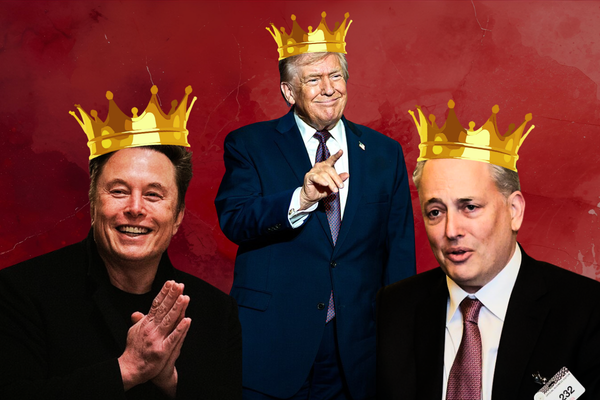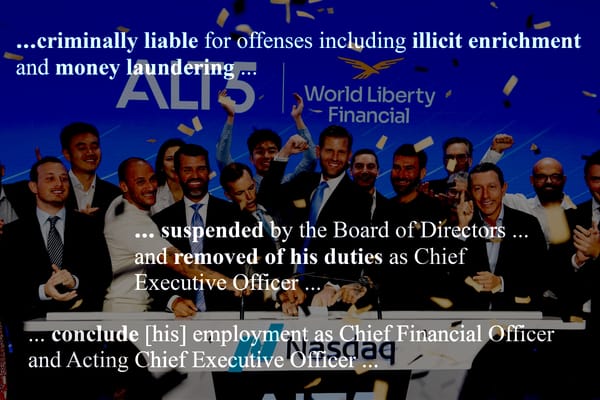Issue 96 – Redefining solvency
Sam Bankman-Fried makes his case for a retrial and aspiring crypto banks hit roadblocks


Sam Bankman-Fried is taking a longshot bid at having his conviction and 25-year sentence overturned, arguing that FTX was never insolvent and that he was improperly prohibited from telling the jury about his lawyers’ involvement in various aspects of FTX’s business. Though the presentation to and questioning by the appeals court has completed, it may be several months before they come to a decision.
Besides that, crypto banks are having a bit of a tough time of things. Custodia Bank’s ongoing attempts to convince courts that the Federal Reserve is required to grant them a master account has hit another setback, with an appeals court affirming a lower court’s rejection of that argument. And Coinbase’s application for a national trust bank charter is meeting resistance from banking groups, who argue it would be dangerous to approve their application.
In the courts
SBF
Two years after a jury found him guilty on all seven felony charges related to the implosion of his FTX cryptocurrency exchange, Sam Bankman-Fried returned to court seeking to overturn the conviction and get a new trial with a new judge. Ever since the November 2022 collapse, Bankman-Fried has insisted that the company was solvent and that the shortfall was nothing more than a temporary liquidity squeeze caused by a sudden wave of withdrawals. He argues that bankruptcy proceedings — now on track to fully repay customersa — validate that claim. Those repayments, however, have been made possible largely by the post-bankruptcy increase in crypto prices and a fortuitous investment in Anthropic, whose value soared amid the consumer AI chatbot boom. On October 30, Bankman-Fried, who has recently begun posting to Twitter from behind bars via a friend, uploaded a 15-page document claiming to prove that FTX would be worth $136 billion today had the bankruptcy team not squandered the company’s assets, though the document was riddled with claims that contradict other company filings.1 Bankman-Fried has since suggested that his claims that the company was solvent are based on his own definition of “solvency”.2
In addition to the solvency argument, Bankman-Fried is hoping to convince the panel that Judge Kaplan deprived him of a fair trial by prohibiting him from discussing his reliance on legal advice from FTX’s attorneys. According to his lawyer, Alexandra Shapiro, had Bankman-Fried been permitted to discuss FTX’s solvency and his conversations with lawyers, he would have convinced a jury that he never intended to steal customer funds, and was merely a man who made some mistakes while on the frontier of a nascent and complex industry.
The three-judge panel has not returned a verdict on the appeal, and may well take several months to do so. However, questions aimed at Bankman-Fried’s attorney suggest they’re skeptical of his assertion that he was denied a fair trial, or that any of the arguments he’s claimed Judge Kaplan unfairly prohibited him from making would’ve swayed the jury.
Addressing the solvency claims, the judges reminded Bankman-Fried’s defense team that a crime is not absolved simply because victims are ultimately made whole. A government prosecutor argued that the evidence against Bankman-Fried was conclusive, and that several of his fellow executives testified that he knowingly misappropriated customer funds to use on investments or political expenditures. And a recent Supreme Court case closed off one of Bankman-Fried’s avenues of argument around intent, with an opinion in Kousisis v. United States earlier this year ruling that a person who fraudulently induces a victim into a transaction can still be convicted of fraud even if they didn’t intend to cause the victim to lose money.34
On the topic of legal advice, the judges questioned why Bankman-Fried opted not to bring an advice-of-counsel defense during the trial if they wished to claim Bankman-Fried was operating in good faith but led astray by bad legal advice. As I wrote shortly before the trial, there was likely a reason he didn’t opt to formally advance this defense:
[T]hey've stopped short of bringing a formal advice-of-counsel defense, which would require them to show that Bankman-Fried gave his lawyers a full understanding of what he intended to do, then dutifully followed their advice in doing it. This is typically a tricky defense to pull off, and his team may have decided against pursuing it due to concerns that those lawyers could respond by sharing documents that further implicate him.
The judges noted that merely having lawyers on staff doesn’t prove Bankman-Fried was operating in good faith. Circuit Judge Barrington Parker added, “If you had advanced the advice-of-counsel defense, a lot of this stuff, I agree, would have been much more probative, but you gave that up, and you just have this vague, you know, ‘there were attorneys out there somewhere,’ defense.”5
Samourai Wallet
Privacy advocates in the crypto world have been closely watching the Samourai Wallet case [I56, 57, 83, 84, 90], with many comparing it to the highly controversial prosecution of Tornado Cash founder Roman Storm [Tornado]. The Samourai Wallet founders, who pleaded guilty to one count of conspiracy to operate an unlicensed money transmitting business in exchange for prosecutors dropping the more severe money laundering conspiracy charge, have maintained that they were merely developing privacy-preserving software, and that they were not responsible for criminal use of the software. Prosecutors have argued that the developers actively intended the software to be used for criminal purposes, pointing to marketing aimed at “Dark/Grey Market participants” and those engaged in “Illicit activity”.
Prosecutors have sought a five-year sentence for the two founders — the statutory maximum for the charge — and Keonne Rodriguez received that full sentence, plus a $250,000 fine. Rodriguez has already paid $6.3 million in forfeiture. Judge Cote cited a letter to the court in which Rodriguez continued to say that he was merely motivated by a desire to protect financial privacy and not “a desire to facilitate criminal activity” as evidence that Rodriguez “has not come to terms with what he did. ... The letter indicated to me that you were very much still operating in a world with moral blinders on.”6 William Lonergan Hill, Rodriguez’s cofounder, will be sentenced later this month.
In bankruptcies
Bittrex, a US-based crypto exchange that shut down and filed for bankruptcy in 2023 after paying fines for sanctions violations and breaches of securities laws [W3IGG], has been accused by an outside researcher of fabricating transactions reported in its bankruptcy proceedings. Pasha Onur published a report outlining evidence that they believe “with 100% confidence constitutes fake and forged transactions” amounting to around $500 million. The report notes large numbers of improbable transactions for amounts of bitcoin worth fractions of a cent, which is irrational behavior by users who would be paying $25 or more in transaction fees. The withdrawals to bank accounts are also below the platform’s withdrawal limits. Other transactions in Bittrex’s report claimed withdrawals from blockchains that had shut down years earlier. Onur also noticed that the data claims that many different Bittrex users all made withdrawals of identical, highly precise amounts of tokens (for example, 0.00022083 BTC) on the same day.7
In the White House
The White House is now trying to walk back President Trump’s statements about not knowing who he just pardoned by claiming that Trump merely meant he doesn’t have a personal relationship with Binance founder Changpeng Zhao. This might be more plausible if Trump had just said “I don’t think I ever met him” and not immediately followed it with “I have no idea who he is.” In a press conference, White House Press Secretary Karoline Leavitt added that Trump “has officially ended the Biden administration’s war on the cryptocurrency industry. And I think that’s the message he sent with this pardon.”8
In regulators
Custodia Bank has lost its appeal of a 2024 court ruling that found that the firm was not entitled to a Federal Reserve master account. In the original decision, Judge Scott Skavdahl opined, “If Custodia’s position was correct, it would effectively mean that every depository institution chartered under the laws of a state, regardless of how soundly crafted, is entitled to a master account allowing it direct access to the federal financial system.” [I54]. This decision was affirmed in a 2–1 opinion in the Tenth Circuit, which concluded, “the plain language of the relevant statutes grants Federal Reserve Banks discretion to reject master account access requests from eligible entities and, therefore, we reject Custodia’s attempt to impair the Fed’s ability to safeguard our nation’s financial system through the exercise of discretion to reject master account access.”9 Custodia has nevertheless celebrated that one judge disagreed with the conclusion, and has claimed that there is a circuit split that could qualify them for rehearing.10
Meanwhile, Coinbase is facing some opposition from banks over its application for a national trust bank charter [I95]. The Independent Community Bankers of America, the main trade group for community banks, submitted a letter to the Office of the Comptroller of the Currency expressing their position that the Coinbase National Trust Company has “demonstrably flawed risk and control functions while operating under a governance structure that prevents independent oversight” and “would struggle to achieve and maintain profitability during crypto bear markets, the very time at which the similarly concentrated Coinbase would be least able to provide support”. They also write that “The OCC’s untested receivership framework would struggle to resolve an uninsured institution of CNTC’s proposed scale and operational complexity, particularly given the technical challenges of crypto custody and CNTC’s likely importance as a dominant crypto ETF custodian.” The letter cites multiple recent enforcement actions by US and UK regulators against the Coinbase and the company’s May 2025 disclosure of a major cybersecurity breach [I84] as evidence of “a continuous pattern of compliance and operational failures. Indeed, over the past five years, Coinbase has never had a year without being subject to an enforcement action, spanning multiple jurisdictions (US, UK) and regulatory domains (BSA/AML, licensing, market integrity).” (Another enforcement action against Coinbase in Ireland, which I will describe in a moment, was announced several days after this letter, and so was not included.) They conclude that “This Application fails to meet statutory chartering standards, presents compounding safety and soundness risks, and would set a dangerous precedent for the structure of the U.S. banking system.”11
The Bank Policy Institute also submitted a letter in opposition, writing that “we have deep concerns that approval of the Application, whether alone or in conjunction with the similar applications recently filed, would: (i) exceed the scope of the OCC’s authority ...; (ii) permit the national trust bank charter to be used in a new and untested manner that could significantly increase risks to the U.S. financial system; and (iii) create an unlevel playing field that would harm traditional federal- and state-chartered banks and inhibit their ability to serve the credit needs of their communities.”12 The BPI also recently submitted letters opposing national trust company charter applications by Ripple, Circle, Paxos, National Digital Trust Company, and Wise, warning “endorsing this pathway and allowing firms to choose a lighter regulatory touch while offering bank-like products could blur the statutory boundary of what it means to be a ‘bank,’ heighten systemic risk and undermine the credibility of the national banking charter itself.”13
Coinbase’s Chief Legal Officer, Paul Grewal, was furious at the ICBA’s submission, writing on Twitter, “Imagine opposing a regulated trust charter because you prefer crypto to stay … unregulated. That’s ICBA’s position. It’s another case of bank lobbyists trying to dig regulatory moats to protect their own. From undoing a law to go after rewards to blocking charters, protectionism isn’t consumer protection.”14 His statement was met with mixed responses, with some agreeing with his claim that traditional banks were seeking to exclude competitors. Others were more skeptical. “Imagine approving an application that fails to meet statutory chartering standards so that your latest DeFi scamcoin has some air of legitimacy,” replied one commenter.15 “Says the co[mpany] encouraging clients to take on 10x-50x leverage. ‘Trust me, bro.’” wrote another.16
Outside the US
The Central Bank of Ireland has fined Coinbase €21.5 million (~$24.9 million) for failures in its anti-money laundering and counterterrorism transaction monitoring programs from 2021 to 2025.
Coinbase Europe has been fined due to faults in the configuration of their transaction monitoring system, which resulted in more than 30 million transactions not being properly monitored over a 12-month period. The value of these transactions amounted to over €176 billion, and accounted for approximately 31% of all Coinbase Europe transactions conducted in the period when the faults existed. Further, it took Coinbase Europe almost three years to fully complete the monitoring of the impacted transactions. This subsequent monitoring led to the reporting of 2,708 [Suspicious Transaction Report]s to the FIU for further analysis and potential investigation. The STRs submitted in respect of the late monitoring of the transactions contained suspicions associated with serious criminal activities including: money laundering; fraud/scams; drug trafficking; cyber-attacks (malware/ransomware); and child sexual exploitation.
Coinbase Europe had outsourced its transaction monitoring to Coinbase Inc., its American counterpart.17
France’s National Assembly has passed a tax amendment that would add cryptocurrency to an “unproductive wealth” category, which also includes gold, coins, antique cars, yachts, and artwork. The amendment will impose a 1% tax on these assets for individuals who hold more than €2 million (~$2.3 million) worth of them.18
Romania has banned Polymarket as an unlicensed gambling website, with the country’s gambling regulator stating that they “will not allow the transformation of blockchain into a screen for illegal betting.”19
Faruk Fatih Özer, the CEO of the collapsed Turkish Thodex cryptocurrency exchange who was sentenced to 11,196 years in prison in 2023 [W3IGG], has died in prison of an apparent suicide.20 Thodex was one of the largest crypto exchanges in Turkey until Özer disappeared along with around $2 billion in customer and investor funds. After a year in hiding in Albania, Özer was arrested and extradited in 2023, and sentenced later that year [W3IGG].
The Web3 is Going Just Great recap
There were five entries between October 28 and November 7, averaging 0.5 entries per day. $217.68 million was added to the grift counter.
- Elixir shuts down deUSD after Stream Finance halt [link]
- Moonwell accrues almost $3.7 million of bad debt after oracle malfunction [link]
- Stream Finance halts activity after $93 million loss [link]
- Balancer exploited for at least $110 million [link]
- Garden hacked for $11 million [link]
In the news
I helped Reuters with some of the blockchain analysis for this long read about how much Trump and his family members have profited from their crypto businesses.
I joined an episode of AARP’s scam awareness podcast to weigh in on an incident in which a Coinbase customer lost $180,000 in a phishing scam. I explained that these scams are unfortunately extremely common, detailed the ways that phishing scammers trick customers into handing over control of their accounts, and explained some of the crypto-specific challenges when it comes to trying to recover funds for scam victims.
That's all for now, folks. Until next time,
– Molly White
Have information? Send tips (no PR) to molly0xfff.07 on Signal or molly@mollywhite.net (PGP).
I have disclosures for my work and writing pertaining to cryptocurrencies.
Footnotes
The FTX estate’s claim that it will reimburse all victims by 100% or more has been controversial among creditors, as these reimbursements are based on the dollar value of crypto assets at the time of FTX’s collapse, when markets were the lowest they’d been in some time [I49, 50]. Many customers have objected to this strategy, arguing that they should be repaid in-kind, and that this repayment strategy unfairly deprives them of gains on assets like bitcoin, which are worth 500% more now than they were then. ↩
References
“Sam Bankman-Fried's Last Chance? Appeals Court to Hear Arguments on FTX Founder's Retrial Motion Next Week”, CoinDesk. ↩
Kousisis v. United States, SCOTUSblog. ↩
“Appeals Court Seems Unmoved by Sam Bankman-Fried’s Claims of an Unfair Trial”, CoinDesk. ↩
“Samourai Wallet Developer Sentenced to 5 Years in Prison for Unlicensed Money Transmitting”, CoinDesk. ↩
“URGENT: Evidence of Fabricated Transactions in Bittrex Bankruptcy Case”, Pasha. ↩
“Press Secretary Karoline Leavitt Briefs Members of the Media, Nov. 4, 2025”, The White House. ↩
Opinion filed on October 31, 2025. Document #167-1 in Custodia Bank v. Federal Reserve Board of Governers (10th Cir.) ↩
Re: ICBA Letter In Opposition To Coinbase National Trust Company’s Charter Application (2025-charter-343449), Independent Community Bankers of America. ↩
Re: Coinbase National Trust Company, Charter Application (2025-Charter-343449), Bank Policy Institute. ↩
“BPI Urges OCC to Preserve the Integrity of National Trust Charters”, Bank Policy Institute. ↩
“The Central Bank takes enforcement action against Coinbase Europe Limited for anti-money laundering failures”, press release by the Central Bank of Ireland. ↩
“France's new 'unproductive wealth' tax reflects a limited adjustment”, Le Monde. ↩
“Romanian Regulator Blacklists Polymarket as 'Gambling That Must Be Licensed'”, Decrypt. ↩
“CEO of collapsed Thodex exchange found dead in Turkish prison while serving 11,196-year sentence: report”, The Block. ↩




